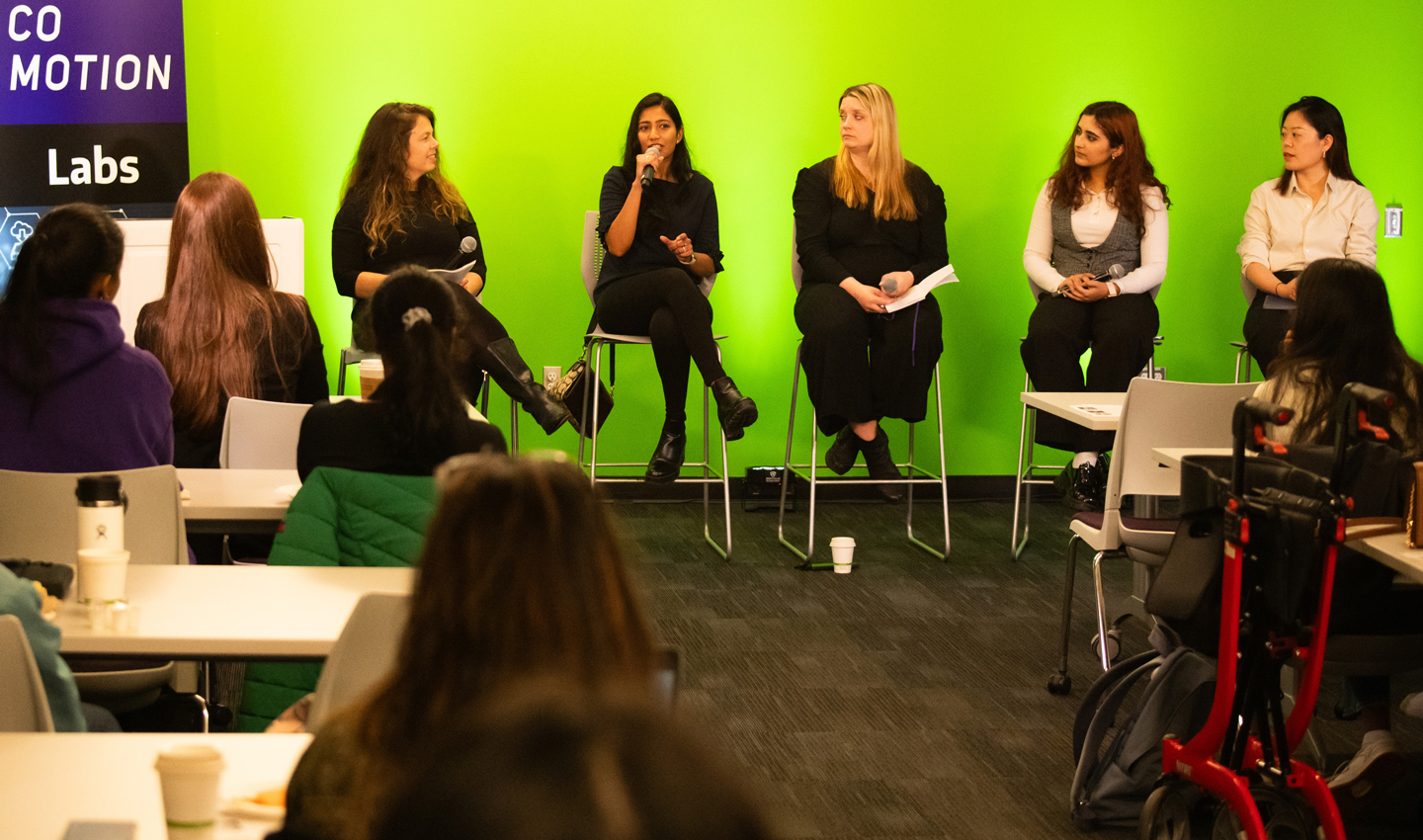With the launch of the iStartup Lab, new entrepreneurship courses available to students, and opportunities to develop a startup idea from the hackathon stage to a full-fledged company, now is a rewarding time to be an entrepreneur at the University of Washington Information School.
“I tell my students all the time, the classroom is the practice space,” said Sara Sanford, assistant teaching professor and the founder and principal consultant of GEN Certification. She was speaking to an audience gathered at Startup Hall on Feb. 21 for an event focused on women in entrepreneurship. The Information School, in partnership with the Buerk Center’s Women’s Entrepreneurial Leadership program (WE Lead), hosted the evening in advance of Women’s History Month.
The Entrepreneurial iSchool Women Panel featured a strong lineup of iSchool alumni: Ishita Bhandari, MSIM ’20; Ashley Farley, MLIS ’17; Sophin Liu, MSIM ’20; and Raiham Malik, Informatics ’22. Sanford moderated the discussion.
Bhandari, who founded Watto AI, pointed to boldness as a key characteristic she has worked to develop, as well as knowing when to delegate. Finding support in her community and groups for underrepresented founders has been an important part of her entrepreneurial process, she said.
Bhandari spoke about her process of developing and prototyping ideas, going to as many hackathons as she could, and building her company on the side while working full-time. When an idea she was working on for months didn’t find a customer base, she moved on to one of her other ideas.
“Sometimes things won’t work out the way you think, and that’s fine, as long as you don’t give up,” Bhandari said. She was driven to be an entrepreneur, so she persisted. It was a fun side project idea that she had experimented on with friends that ended up earning support from early-stage startup accelerator Y Combinator.

For all of the panelists, intrapreneurship as well as entrepreneurship shaped their path as innovative leaders. Intrapreneurship is a way to deliver innovative ideas and solutions within the organization where you work.
Farley spoke to this approach, embracing her own leadership path in her role in Knowledge and Resource Services at the Gates Foundation. She shared insights from navigating the unwritten rules of change and leadership. Farley said that she has learned that she can and should take risks, and to worry less about following entrenched rules that need to be changed.
“It’s important to know when to pull the plug on something or when to pivot,” Farley said. “I like to think of that not as a failure per se, but as a learning opportunity, because I think you do learn a lot from what doesn't work — and that's just as important for what does.”
Liu, who has an MBA in addition to her MSIM degree, teaches a data science course at the iSchool that is focused on machine learning. She gained extensive experience working in business intelligence and analytics, and led a Capstone project as its sponsor. She said that the iSchool prepared her to break down complex projects into manageable steps.
“Be open minded,” Liu advised. “Especially when you’re working for startup companies, there are people from different cultures, different backgrounds. Learn about the differences,” she said, and commit to improving your skill set. “When you do really good quality work, people remember you,” she said.
Malik’s experience working at a startup prior to founding her company, mAlIk Software, provided valuable insights into the pace and typical workflows of a new business. Recognizing that code review was creating a slowdown, she developed tools for integrating AI into code review that are now part of her own company’s offerings.
Malik said that remembering that she has champions who have her back encourages her, and that her mother, a fellow business owner, inspired her on her entrepreneurial journey.
For Sanford, the startup world comes down to relationships. “I tell my students who are putting in 300 applications for jobs – just go form one or two good relationships,” she told the 30 people in attendance. “It’s going to take you so much farther toward what you want to do next.”
To navigate the inevitable risks of founding a company, Sanford recommended that aspiring entrepreneurs get buy-in and find people they trust with whom they can workshop ideas and build encouragement.
iSchool entrepreneurs use their UW network as they build their projects and companies; Malik recently hired MSIM student Fahmia Ali as a product management intern.
The alumni speakers encouraged students who are interested in entrepreneurship to connect with one another, try different ideas, and to reach out to iSchool faculty, recognizing that there are many ways to apply entrepreneurship.
The panelists encouraged anyone who’s interested in entrepreneurship to go for it.
“When you’re stepping into a space where you might not feel welcomed, or maybe you’re not welcomed, it’s important to recognize that you have champions behind your back,” Malik said. “We’re your champions now, too.”
